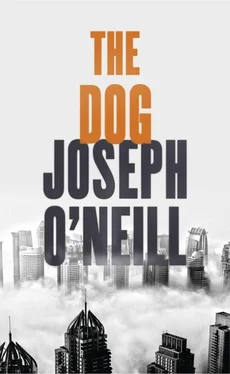‘I see,’ I say, quite literally, because I’m envisioning Dubai policemen charging in and taking me away.
We shake hands. ‘Thank you for your hospitality,’ he says.
No sooner have I closed the door behind Watson than I start packing. Mysteriously, I find myself moving with the efficiency of an assembly-line worker, i.e., someone who has performed my actions thousands of times. I limit myself to that quantity of belongings capable of fitting into one laptop bag and one carry-on case. The decision is easily made, because I have nothing physical I’m attached to, and because to eliminate stuff is a dark, strong joy. There is the temptation to keep going — to eliminate even one’s only bag. The temptation must be resisted, arising as it does from a mistaking of actual luggage for that which is dragged around psychically. Ridding oneself of a perfectly wearable pair of underpants solves nothing.
I must not, in my haste, forget my passport. Very good: it’s still valid. Mine is the new, so-called biometric edition. A huge bald-eagle head dominates the page above my photograph. The bald eagle would only have to lean over to gobble up my head. These days, the US passport looks like a picture book for children. To flip through it is to contemplate, beneath festive clusters of exit and entry stamps, renderings in pen-and-ink of an alleged American quintessence: a farmer and two oxen ploughing the prairie; cowboys riding with cattle; a grizzly bear devouring a salmon; a Mississippi steamboat; a sailing ship off the New England shore; and so on. This folksy, somewhat ominous little graphic paperback ends with an image of North America viewed from space, as if through the eyes of an awed celestial being. The moon is in the picture, too, perhaps to indicate our nation’s extraterrestrial reach.
The blue pages put me in mind of the carpets of Zurich, pale-blue fields on which I daily spent hours playing and massacring with the plastic little cowboys and soldiers and Indian braves that served as dolls for small boys of my generation. These battles — GIs firing bazookas at the redskins behind the table leg, flamethrowers clearing gladiators out of the deep-pile carpet — connected the young me to his rumoured fatherland, for which I felt a homesickness that strangely only deepened when I moved there. It is from this era that I retain one of my few ineliminable memories of my mother. She is standing at the sink, washing up in Switzerland.
There are quotations above the pictures, I see:
Let every nation know, whether it wishes us well or ill, that we shall pay any price, bear any burden, meet any hardship, support any friend, oppose any foe, to assure the survival and the success of liberty.
John F. Kennedy
Let us raise a standard to which the wise and honest can repair.
George Washington
The cause of freedom is not the cause of a race or a sect, a party or a class — it is the cause of humankind, the very birthright of humanity.
Anna Julia Cooper
My country is now in the sixth grade?
I bear in mind that expatriation is distortive. I accept the proposition that I wrongly see the USA as a Jenn-land and my feelings about it are accordingly twisted. I quash my rebel’s excitement. I factor into my thinking the panic of the fugitive. I reject as unreliable and extraneous to the decision I must make the jolt of abhorrence caused by my passport and my sudden insight that American nationhood is part of an outdated worldwide protection racket and that it should be possible, surely, to live without a state’s say-so. I set to one side all theories and systems. Bailiffs, clear the room: Jenn, Don Sanchez, the Batroses, the three Ted Wilsons, the contemptible couple from the A train — I want all of them out. I must be left alone. I must deliberate.
I will deliberate in the Pasha. When I take a seat, I shift a little in order to remove my passport from a buttock pocket. The egg-shaped blue marks of the Department of Homeland Security declare ADMITTED and ADMITTED and ADMITTED.
The phone. Ali!
‘Ali!’ I say, clambering out of the Pasha. ‘How are you? Are you OK?’
‘I am at the airport, boss,’ Ali says.
He’s one step ahead of me, as always. He has foreseen my departure and is in position to wave goodbye.
From what he next tells me, I gather that Ali is about to board a plane. I gather that his application for Emirati citizenship somehow resulted in an unrefusable offer of citizenship of the Union of the Comoros. I gather that he has a wife and two children. I gather he is now about to leave for the Comoro Islands in the company of his wife and two children. I gather he has no option. I gather that, as a Comorian national, he can no longer be in Dubai because he now has another place where he can be.
‘I want to say thank you, boss,’ Ali says. ‘You have helped me.’
‘No, I thank you, Ali’ is all I can think to say to him. ‘Good luck to you and your family. Stay in contact,’ I say, very stupidly, because there is no way that Ali and I will be able to stay in contact. ‘OK,’ he says, and he disconnects. My friend is gone.
But gone how? To what effect? Not to devalue Ali’s subjectivity, but for me his fate lacks depth. The Comoros?
Surely there’s time for one last search.
The top search suggestion is ‘Comoros crash’: the Comoros are notable, in the first place, as a site of aviation accidents. They constitute a sovereign state and comprise a chain of volcanic islands in the Mozambique Channel, northwest of Madagascar. Since independence from France was achieved in 1975, the islands have seen twenty coups/attempted coups. Comorian and French are the main languages; Arabic is also spoken. The main economic activity is agriculture: vanilla is cultivated there, and the islands are the world’s largest producer of ylang-ylang, the oil of which is an ingredient of Chanel No. 5 perfume. Photographs of the Comoros show a lake in a crater, a mongoose lemur perched on the rusted tin roof of a one-roomed residential proposition, and a very rundown little port, Moroni, the capital. Its old colonial warehouses give prettily on to forested uplands; its fishing boats lie prettily at anchor; there is no sign of activity.
Hold the airplane door, Ali, I’m coming.
Let’s not be rash. Let’s take a closer look.
Unemployment is very high in the Comoros. About half the population lives on less than 1.25 USD a day. People regularly try to ‘escape’ to the nearby island of Mayotte, a French overseas department, and a good number drown in the attempt. As for Moroni, it sits at the foot of a highly active volcano. ‘Moroni’ is Comorian for ‘in the heart of the fire’.
I will not be joining Ali.
I’m shutting the laptop when, for old times’ sake, and for the first time in a long time, and for the last time, I swear, I search myself, X. and all. Autocomplete suggests:
dubai
attorney
forcible touching
gay
The defamation continues. It’s shocking. It’s enough to make me want to lie down.
It’s back into the Pasha. And it’s back, on recollection’s ice, to Mar-A-Lago.
The wedding of Melania Knauss and Donald Trump was an unusual event, but I think it may have been especially out of the ordinary for Jenn and me, who in the context of that gathering qualified as so-called ‘real people’ or ‘civilians’. This was in January 2005, in the very early, very successful days of The Apprentice , and many well-known NBC ‘personalities’ and stars of reality television were wedding guests, and of course there were celebrities from other walks of life and reality. Jenn and I knew nobody there and yet, by an enchanting paradox, we were able to identify many of those present. These individuals had the charisma and suddenness of fauna. Here was Barbara Walters, startling as a secretary bird; there, like a small upstanding crocodile, was Paul Anka. It was especially outlandish to sight them in the church. The fellow next to me on the pew had a familiar TV-face — Pat O’Brien, I later figured out, the Access Hollywood host who afterwards had a brush or two with disrepute, poor devil — and I remember that I could not help feeling it odd that he and his ilk should have to squeeze into the hard pews and humble themselves on the kneelers like everybody else. Jenn and I of course were known to nobody, but by virtue of our mere occurrence were understood to possess imperceptible power or renown, and certainly wealth. Almost every net-worth present at the wedding was very high, I would say. At dinner, I was seated near two likeable, non-famous, not-loaded-looking guys who said they were connected to the bridegroom by business. It was a relief to locate people on my own level, and we were able to talk about this and that. I kind of dried up when they began to exchange details of the résumés of their pilots. This isn’t in any way to pooh-pooh them or the occasion.
Читать дальше
Конец ознакомительного отрывка
Купить книгу












